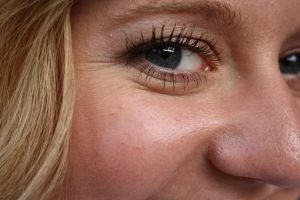Written by Taylor Woosley, Staff Writer. 12-week supplementation with BB-1000 (blackberry fermented by Lactobacillus plantarum JBMI F5) at 800 mg/day reduced the degree of eye wrinkles to 0.22 ± 0.47 from baseline at 12 weeks. Furthermore, the skin wrinkle volumes of the BB-1000 group increased by 2.65 ± 1.94 mm3 at 12-weeks, compared to placebo (p < 0.05).
 Skin is the organ with the largest contact area between the human body and the external environment and is a barrier that separates the human body from the environment1. Skin aging is characterized by a progressive loss of functionality and regenerative potential2. Cutaneous aging is induced by both intrinsic and extrinsic factors3. Intrinsic aging stands for the “normal” physiological breakdown of the skin, associated mostly with chronological age and resulting in thinner skin and wrinkle formation4. Extrinsic factors that play a vital role in the development of aging include air pollution, long-term exposure to solar ultraviolet (UV) radiation, and poor nutrition5.
Skin is the organ with the largest contact area between the human body and the external environment and is a barrier that separates the human body from the environment1. Skin aging is characterized by a progressive loss of functionality and regenerative potential2. Cutaneous aging is induced by both intrinsic and extrinsic factors3. Intrinsic aging stands for the “normal” physiological breakdown of the skin, associated mostly with chronological age and resulting in thinner skin and wrinkle formation4. Extrinsic factors that play a vital role in the development of aging include air pollution, long-term exposure to solar ultraviolet (UV) radiation, and poor nutrition5.
Recent reports have shown clinical results of protection against skin damaging and aging by natural products such as berries6. Blackberry (Rubus fruticosus B) is a robust source of phenolic compounds, along with possessing antioxidative and anti-inflammatory properties7. Of the phenolic compounds, the anthocyanins and ellagic acid present in the berries reduce the inflammatory response via the nuclear factor kappa-light-chain-enhancer of activated B cell (NF-ĸB) pathway8.
Lee et al. conducted a randomized, double-blind, placebo-controlled, parallel study using BB-1000, a product containing blackberry fermented with Lactobacillus (L). Plantarum JMBI-F5 to evaluate the use of BB-1000 on wrinkle improvement in Korean participants aged 35 to 60 years with dry skin and wrinkles. Subjects (n=74) were randomized to one of two groups, placebo (n=37) or treatment group (500 mg/capsule of BB-1000). Inclusion criteria included scoring grade 3 or higher for both the left and right eye wrinkles based on the photographic evaluation criteria. At visit 2 (randomization visit, week 0), participants were assigned to groups and received the BB-1000 supplement or placebo at a dose of 800 mg/kg/day for 12 weeks.
Wrinkle changes were compared by photographic evaluation, with skin imaging being measured using MARK Vu. Wrinkles in the corners of the eyes were measured using PRIMOS lite, along with analyzing average roughness, maximum peak-to-valley, maximum peak height, maximum valley depth, and maximum average roughness parameters. Skin moisture content was measured using a Corneometer CM 825. Statistical analysis was performed using SAS. Paired t-test or Wilcoxon signed rank test was utilized to analyze changes between groups. Significant results of the 12-week study are as follows:
- The effect of BB-1000 wrinkle reduction was significantly reduced to 0.22 ± 0.47 from the baseline at 12 weeks.
- At 12 weeks, the BB-1000 group increased by 2.65 ± 1.94 mm3, compared to the placebo group (1.49 ± 1.36 mm3), which was statistically significant between the groups (p < 0.05).
- After 12 weeks, the skin moisture content of the placebo and the BB-1000 groups increased to 4.20 ± 1.70 AU (p < 0.0001) and 4.77 ± 1.78 AU (p < 0.0001).
Findings of this 12-week trial show that oral supplementation of BB-1000 significantly improved eye wrinkles compared to placebo, however no effect on increased skin moisture content was noted. Further studies should continue to explore the efficacy of BB-1000 at different dosages and lengths of trial with a larger subject group.
Source: Lee, Sang-Wang, Hong-Sig Sin, Joon Hurh, and Seon-Young Kim. “Anti-Wrinkle Effect of BB-1000: A Double-Blind, Randomized Controlled Study.” Cosmetics 9, no. 3 (2022): 50.
© 2022 by the authors. Licensee MDPI, Basel, Switzerland. This article is an open access article distributed under the terms and conditions of the Creative Commons Attribution (CC BY) license (https:// creativecommons.org/licenses/by/ 4.0/).
Click here to read the full text study.
Posted October 10, 2022.
Taylor Woosley studied biology at Purdue University before becoming a 2016 graduate of Columbia College Chicago with a major in Writing. She currently resides in Glen Ellyn, IL.
References:
- Cao C, Xiao Z, Wu Y, Ge C. Diet and Skin Aging-From the Perspective of Food Nutrition. Nutrients. Mar 24 2020;12(3)doi:10.3390/nu12030870
- Csekes E, Račková L. Skin Aging, Cellular Senescence and Natural Polyphenols. Int J Mol Sci. Nov 23 2021;22(23)doi:10.3390/ijms222312641
- Zhang S, Duan E. Fighting against Skin Aging: The Way from Bench to Bedside. Cell Transplant. May 2018;27(5):729-738. doi:10.1177/0963689717725755
- Khmaladze I, Leonardi M, Fabre S, Messaraa C, Mavon A. The Skin Interactome: A Holistic “Genome-Microbiome-Exposome” Approach to Understand and Modulate Skin Health and Aging. Clin Cosmet Investig Dermatol. 2020;13:1021-1040. doi:10.2147/ccid.S239367
- Umbayev B, Askarova S, Almabayeva A, Saliev T, Masoud AR, Bulanin D. Galactose-Induced Skin Aging: The Role of Oxidative Stress. Oxid Med Cell Longev. 2020;2020:7145656. doi:10.1155/2020/7145656
- Kim HR, Jeong DH, Kim S, et al. Fermentation of Blackberry with L. plantarum JBMI F5 Enhance the Protection Effect on UVB-Mediated Photoaging in Human Foreskin Fibroblast and Hairless Mice through Regulation of MAPK/NF-κB Signaling. Nutrients. Oct 11 2019;11(10)doi:10.3390/nu11102429
- Wang PW, Cheng YC, Hung YC, et al. Red Raspberry Extract Protects the Skin against UVB-Induced Damage with Antioxidative and Anti-inflammatory Properties. Oxid Med Cell Longev. 2019;2019:9529676. doi:10.1155/2019/9529676
- Pyeon S, Kim OK, Yoon HG, et al. Water Extract of Rubus coreanus Prevents Inflammatory Skin Diseases In Vitro Models. Plants (Basel). Jun 17 2021;10(6)doi:10.3390/plants10061230
